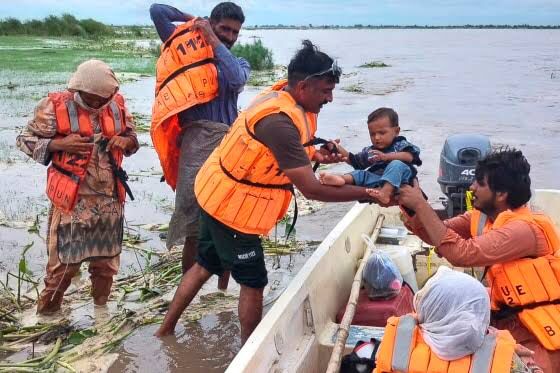
Residents are evacuated from flood-hit areas in Punjab province, Pakistan, after India released water from overflowing dams into low-lying border regions. Image credit: NBC News
India issued a rare public warning to Pakistan about possible cross-border flooding, marking the first diplomatic contact between the two nuclear-armed neighbors in months.
Pakistan’s National Disaster Management Authority (NDMA) said it had alerted authorities in Punjab province about a surge in the Sutlej River and potential flooding. Evacuation efforts are underway across multiple districts. More than 14,000 people were moved from Kasur district, and over 89,000 were relocated from Bahawalnagar near the Indian border.
Authorities have urged residents to avoid rivers, streams, and other low-lying areas, limit unnecessary travel, and follow alerts disseminated via television, mobile phones, and the NDMA’s disaster app.
The evacuation coincides with ongoing heavy monsoon rains across South Asia. In Pakistan’s northwest, sudden flash floods in Buner district earlier this month killed more than 300 people, with many residents reporting that they received no advance warning. Officials said a cloudburst caused the devastation, and many victims were living along natural waterways. Since June 26, seasonal rain-triggered floods have claimed over 800 lives across Pakistan.
The Kashmir region, divided between India and Pakistan but claimed in full by both, has also suffered severe flooding. At least 65 people have died in Indian-administered Jammu, and hundreds have been displaced as rivers and tributaries overflowed. Indian officials reported that muddy floodwaters inundated homes, damaged roads and bridges, and that river levels continued to rise. The Indian Meteorological Department forecasts rains to persist until late Tuesday.
This week’s warning was issued through diplomatic channels rather than the Indus Waters Commission, a permanent mechanism established under the 1960 World Bank-brokered Indus Waters Treaty. India suspended the commission after the April killing of 26 tourists in Indian-controlled Kashmir. Pakistan insists that India cannot unilaterally terminate the treaty, which has survived two wars (1965 and 1971) and a major 1999 border skirmish. Earlier this year, the suspension and scaling down of diplomatic ties contributed to tit-for-tat missile strikes, which ended only after a ceasefire brokered by U.S. President Donald Trump.
Pakistan experiences its monsoon season from July through September and has recently faced multiple cloudburst floods and heavier-than-normal rainfall. Scientists and meteorologists have linked the rising intensity of monsoon rains in South Asia to climate change. The ongoing heavy rainfall has raised fears of a repeat of the 2022 floods, which inundated one-third of Pakistan and killed 1,739 people.
With rivers overflowing and more rain expected, authorities are on high alert. Evacuation and disaster management teams continue working to protect residents in vulnerable areas while monitoring water levels across both countries.



